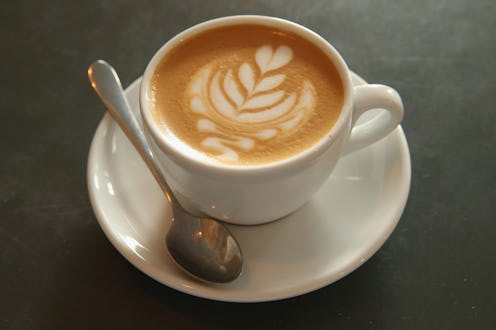This is my morning routine: Wake up. Wash face. Brush teeth. Pour coffee. Park self in front of computer. Start working. (Since I work from home, showering comes later in the day when I reach a good break point.) Apparently, though, I’m accomplishing step four — “pour coffee” — at precisely the wrong time; and in all likelihood, you are, too. When is the best time to drink coffee? According to science, it’s not right after you wake up; it’s at least an hour after you wake up. Apparently my entire adult life has been a lie — or at least, the parts of it that have been overly concerned with coffee consumption have been.
To be fair, this research isn’t new; Steven Miller of the Uniformed Services University of the Health Sciences in Bethesda, Maryland, first published his widely cited write-up in October 2013. Fast Company is currently having their very first Coffee Week (which sounds like the best idea ever to me), though, so in honor of the occasion, they’ve brought this little tidbit back to the surface. I seem to have missed it the first time around anyway, so it’s just as well that we’re getting another look at it now.
Here’s the deal: You’re probably already aware that our bodies run on an internal, 24-hour hormonal cycle called the circadian clock. The circadian clock controls a lot of things, but the relevant piece of info here is that it schedules cortisol production — the hormone that makes us feel more awake. If you want to give yourself a little boost with some coffee, tea, or other source of caffeine, you have to work around your body’s peak cortisol production times — namely, in the hour or two when production levels drop off after a period of high production.
So, when is the best time to drink your morning cup of joe? Let’s say that you typically wake up somewhere between 6 a.m. and 8 a.m. This means that your cortisol levels are up in the early morning before starting to fall around 9:30 a.m., putting your optimal coffee consumption time between 9:30 a.m. and 11:30 a.m. Your cortisol levels will peak again between noon and 5:30 p.m., so if you need a second cup, pour it for yourself sometime after 1:30 p.m. — but I wouldn’t drink it much past 2 p.m. We’ve got loads of research on how badly caffeine disrupts sleep; even consuming it six hours before bedtime negatively affects your ability to get a good night’s rest. Yikes.
The moral of the story: If you’re in the habit of having your morning coffee at home, try switching up your routine and saving it for when you first get to the office. Investing in a sturdy travel mug and filling it with your favorite brew at home will stop you from buying an overpriced to-go cup at the Starbucks around the corner from your office every day, too. Oh, and hey, look! Ryoko Iwata of ILoveCoffee.jp made an infographic out of it! Take a peek below. Happy coffee-ing!



Images: Reaction Gifs; ILoveCoffee.jp
